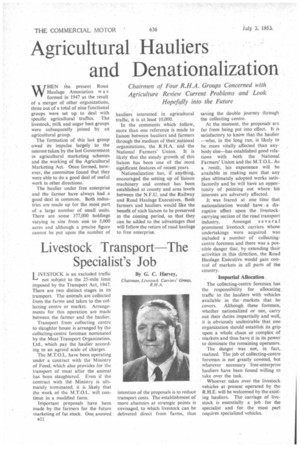Agricultural Hauliers and Denationalization
Page 56

If you've noticed an error in this article please click here to report it so we can fix it.
Chairmen of Four R.H.A. Groups Concerned with Agriculture Review Current Problems and Look Hopefully into the Future
WHEN he present Road Haulage Association w a s formed in 1947 as the result of a merger of other organizations, three out of a total of nine functional groups were set up to deal with specific agricultural traffics. The livestock, milk and sugar beet groups were subsequently joined by an agricultural group.
The formation of this last group owed its impulse largely to the interest taken by the last Government in agricultural marketing schemes and the working of the Agricultural Marketing Act. Once formed, however, the committee found that they were able to do a good deal of useful work in other directions.
The haulier under free enterprise and the farmer have always had. a • good deal in common. Both industries are made up for the most part of a large number of small units. There are some 377,000 holdings varying in size from one to 5,000 acres and although a precise figure cannot be put upon the number of hauliers interested in agricultural traffic, it is at least 10,000.
In the comments which follow, more than one reference is made to liaison between hauliers and farmers through the medium of their.national organizations, the R.H.A. and the National Farmers' Union. It is likely that the steady growth of this liaison has been one of the most significant features of recent years.
Nationalization has, if anything, encouraged the setting up of liaison machinery and contact has been established at county and area levels between the N.F.U. and the Railway and Road Haulage Executives. Both farmers and hauliers would like the benefit of such liaison to be preserved in the coming period, so that they can be added to the advantages that will follow the return of road haulage to free enterprise. saving the double journey through the collecting centre.
At the moment, the proposals are far from being put into effect. It is satisfactory to know that the haulier —who, in the long run, is likely to be more vitally affected than anybody else—has established good relations with both the National Farmers' Union and the M.T.O.L. As a result, his experience will be available in making sure that any plan ultimately adopted works satisfactorily and he will have an opportunity of pointing out where his interests are adversely affected.
It was feared at one time that nationalization would have a disruptive effect upon the livestockcarrying section of the road transport industry. Amongst several prominent livestock carriers whose undertakings were acquired was included a number of collectingcentre foremen and there was a possible danger that, by extending their activities in this direction, the Road Haulage Executive would gain control of markets in all parts of the country.
Impartial Allocation.
The collecting-centre foreman has the responsibility for allocating traffic to the hauliers with vehicles available in the -markets that he covers. Although these foremen, whether nationalized or not, carry out their duties impartially and well, it is obviously undesirable that one organization should establish its grip upon a whole chain or complex of markets and thus have it in its power to dominate the remaining operators.
The danger was not, in fact, realized. The job of collecting-centre foreman is not greatly coveted, but wherever necessary free-enterprise hauliers have been found willing to take over the task.
Whoever takes over the livestock vehicles at present operated by the R.H.E. will be welcomed by the existing hauliers. The carriage of livestock is essentially a job for the specialist and for the most part requires specialized vehicles. .




























































































































































